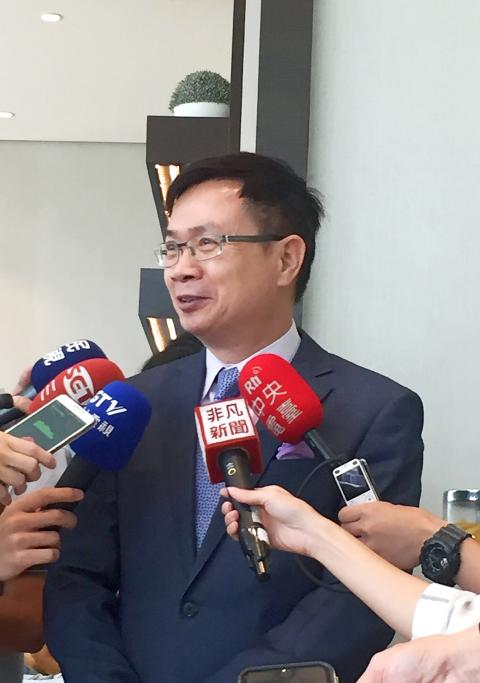Philippine nationals could become eligible for visa-free entry for stays in Taiwan of up to 14 days by next month or November, Ministry of Foreign Affairs Department of East Asian and Pacific Affairs Director-General Winston Chen (陳文儀) said yesterday.
The details of the new policy were hammered out at an interministerial meeting of national security, police, immigration and other officials, Chen said at a news conference, adding that Premier William Lai (賴清德) approved the program on Wednesday.
The government has decided to implement the visa-free program on a trial basis to promote people-to-people, tourist and commercial exchanges between Taiwan and the Philippines, Chen said, adding that the start date for the trial is expected to be announced in a month.

Photo: CNA
The government encourages Manila to follow the principle of reciprocity and grant Taiwanese nationals visa-free privileges as soon as possible, Chen said.
The government has since Aug. 1 relaxed visa rules for nationals of the 10 ASEAN member states, which include the Philippines, as well as for Indian nationals.
Taiwan included the Philippines in its electronic visa program on Oct. 7 last year.
The Travel Agent Association of the Republic of China, Taiwan said it expected the visa-waiver program to attract 33 percent more Philippine visitors to Taiwan next year and boost tourism revenue by NT$2 billion (US$65.8 million).
Tourism revenue from Philippine tourists has been forecast to reach NT$7 billion this year, it said.
The Manila Economic and Cultural Office in Taipei (MECO) later yesterday said that it welcomes the ministry’s plan for the visa waiver program, adding that it would respond to the friendly gesture by relaxing visa requirements for Taiwanese travelers in the Philippines.
In a separate statement, it called for Taipei and Manila to work more closely together, especially on fighting cross-border crime.
That statement came a day after the Taipei Economic and Cultural Office (TECO) in Manila rejected a claim by Philippine President Rodrigo Duterte that drugs in the Philippines originated in Taiwan.
MECO Chairman Angelito Banayo called for closer cooperation in the areas of law enforcement and combating organized crime.
“We all know that organized crime, specifically drug trafficking, knows no borders, which calls for closer coordination between the Philippine and Taiwan authorities,” Banayo said.
MECO and TECO have been working together “closely in forging agreements on law enforcement cooperation aimed at addressing borderless crimes such as drug smuggling and human trafficking,” the statement said.
Such law enforcement agreements are in the pipeline and are expected to be signed by the end of this year or early next year, the statement added.
One of the key components of President Tsai Ing-wen’s (蔡英文) New Southbound Policy is to strengthen collaboration with other nations to fight international crime, which in the case of the Philippines means a concerted effort to combat narcotics, the statement said.

Taiwan is gearing up to celebrate the New Year at events across the country, headlined by the annual countdown and Taipei 101 fireworks display at midnight. Many of the events are to be livesteamed online. See below for lineups and links: Taipei Taipei’s New Year’s Party 2026 is to begin at 7pm and run until 1am, with the theme “Sailing to the Future.” South Korean girl group KARA is headlining the concert at Taipei City Hall Plaza, with additional performances by Amber An (安心亞), Nick Chou (周湯豪), hip-hop trio Nine One One (玖壹壹), Bii (畢書盡), girl group Genblue (幻藍小熊) and more. The festivities are to

Auckland rang in 2026 with a downtown fireworks display launched from New Zealand’s tallest structure, Sky Tower, making it the first major city to greet the new year at a celebration dampened by rain, while crowds in Taipei braved the elements to watch Taipei 101’s display. South Pacific countries are the first to bid farewell to 2025. Clocks struck midnight in Auckland, with a population of 1.7 million, 18 hours before the famous ball was to drop in New York’s Times Square. The five-minute display involved 3,500 fireworks launched from the 240m Sky Tower. Smaller community events were canceled across New Zealand’s

The Ministry of Foreign Affairs (MOFA) yesterday said it is closely monitoring developments in Venezuela, and would continue to cooperate with democratic allies and work together for regional and global security, stability, and prosperity. The remarks came after the US on Saturday launched a series of airstrikes in Venezuela and kidnapped Venezuelan President Nicolas Maduro, who was later flown to New York along with his wife. The pair face US charges related to drug trafficking and alleged cooperation with gangs designated as terrorist organizations. Maduro has denied the allegations. The ministry said that it is closely monitoring the political and economic situation

‘SLICING METHOD’: In the event of a blockade, the China Coast Guard would intercept Taiwanese ships while its navy would seek to deter foreign intervention China’s military drills around Taiwan this week signaled potential strategies to cut the nation off from energy supplies and foreign military assistance, a US think tank report said. The Chinese People’s Liberation Army (PLA) conducted what it called “Justice Mission 2025” exercises from Monday to Tuesday in five maritime zones and airspace around Taiwan, calling them a warning to “Taiwanese independence” forces. In a report released on Wednesday, the Institute for the Study of War said the exercises effectively simulated blocking shipping routes to major port cities, including Kaohsiung, Keelung and Hualien. Taiwan would be highly vulnerable under such a blockade, because it